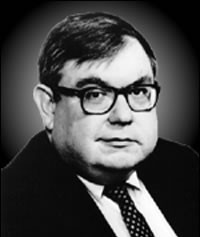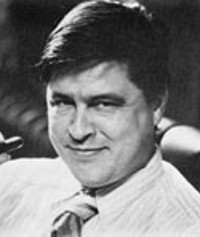 Samuel T. Francis
Samuel T. Francis
Championing
Western Civilization
and the great legacies of
Sam Francis and Joe Sobran
and their allies
 Joseph Sobran
Joseph Sobran
FGF Op-Ed
The Jon Utley Column
December 28, 2018
When George H.W. Bush made plans in 1990 for the first Gulf War, Joe Sobran asked Griffin Communications to organize a Press Conference to announce the formation of the Committee to Avert a Mideast Holocaust. Jon Utley recounts this historic moment which brought about a fractioning of the conservative movement and the beginning of the paleoconservative right. --Fran Griffin
How the Gulf War Gave Us the Antiwar Right
The recent veneration of George H.W. Bush has been wonderfully uplifting, especially as it recalled his cautious use of persuasion and honest argument.
President HW Bush meets with Operation Desert Storm Troops on Thanksgiving Day, 1990. (public domain/US Government)
Peggy Noonan, Ronald Reagan’s former speechwriter, beautifully described Bush’s funeral in the Wall Street Journal as reminding us of our dignity and “re-summoning our mystique.” The event, Noonan said, harkened back to when America was respected and admired, generous and “expected to do good.” President Bush, she noted, had presided over the collapse of the Soviet Union diplomatically and without humiliating Russia’s leaders or its people. He also declined to occupy a Muslim country after defeating Saddam Hussein in Iraq. Bush was indeed a very decent man. In fact, he was a great statesman, as TAC’s editor Jim Antle has noted.
A scrappy libertarian-conservative group forged a path and and opposed H.W. Bush's signature conflict
Yet almost none of the news reported on what was the darkest chapter of his legacy: the First Gulf War. I was a co-founder at the time of a small and vastly outgunned opposition group of conservatives and (mainly) libertarians, the Committee to Avert a Mideast Holocaust. Today, with at least a million Arabs, Afghans, and Americans dead from the unending chaos the United States unleashed in the Muslim world, the name seems very appropriate.
The Committee to Avert a Mideast Holocaust included truly great conservatives: Henry Regnery, almost the only publisher of conservative books, at that time who helped keep liberty alive during the dark days of the 1940s and ‘50s; along with the always brave Pat Buchanan and National Review Senior Editor, Joseph Sobran. We were a virtual who’s who of the incipient libertarian movement: Ron Paul, the once and future Texas congressman who would eventually gain a wider following as a presidential candidate; Lew Rockwell, founder of the Ludwig von Mises Institute who now has the must-read Lew Rockwell website; renowned economist Murray Rothbard; Bill Niskanen, chairman of the Cato Institute; Sheldon Richman, longtime editor of The Freeman magazine for the Foundation for Economic Education (FEE); Justin Raimondo, who would go on to be a co-founder at Antiwar.com; and Burt Blumert, who helped fund much of Rothbard and Raimondo’s work.
Almost none of the news reported on what was the darkest chapter of George H.W. Bush’s legacy: the First Gulf War.
Our chair and guide was Phil Nicolaides, former deputy director at Voice of America during the Reagan era. The executive committee included myself, Richman, Sobran, and chess champion Phil Collier, and Fran Griffin, a leading Catholic activist, paleo-conservative, and eventually Joe Sobran’s and Samuel Francis’s publisher. Fran studied at the University of Chicago, had a radio talk show for several years, had been a candidate for the Illinois State Senate, had worked on Capitol Hill, was formerly media director for the American Conservative Union, and was part of the Reagan for President campaign team.
Her company, Griffin Communications, which represented numerous conservative groups over the years, did tremendous public relations work for the Committee for practically no pay. She got thousands of press releases in the mail, capturing the attention of the media. She managed to get C-SPAN to cover the Committee’s September 4, 1990 Press Conference and have both Nicolaides and Sobran on separate C-SPAN morning shows, which brought national attention (and donations) to the Committee.
If only we had had the Internet then!
The Committee to Avert a Mideast Holocaust included truly great conservatives: Henry Regnery, the always brave Pat Buchanan and National Review Senior Editor, Joseph Sobran, Ron Paul, Lew Rockwell, renowned economist Murray Rothbard, Bill Niskanen, Sheldon Richman, Justin Raimondo, and Burt Blumert.
We did get some news coverage but of course we were no match for Kuwaiti money and evangelical supporters of Israel. Still, the Senate vote in favor of the war was only 52-47, despite the overwhelming propaganda in favor of it as described below.
The war led to a major break between libertarians and conservatives, especially as the giant Heritage Foundation became a champion of war from that moment on. Even today, Heritage has backed continued U.S. support for the Saudi bombing of Yemen.
Much about the Gulf War and especially its lies and subsequent brutality were not reported. Bush himself may not have known all that took place in the military campaign. After all, Dick Cheney, whom we know now to be a liar, was his secretary of defense. But the deeds need to be remembered and indeed researched.
• Not Taking Out Saddam Was George H.W. Bush’s Finest Hour
• 2017: The Year the Iraq War Truly Ended
Our chair and guide was Philip Nicolaides. The executive committee included myself, Richman, Sobran, and chess champion Phil Collier, and Fran Griffin of Griffin Communications.
Particularly odious was the calculated destruction of Iraq’s sanitation, irrigation, and electrical grid, with the intent of causing mass civilian disease and starvation, as specified in a Defense Intelligence Agency report. It would have been interesting to find out who ordered this policy. Reconstruction supplies were then blockaded over the following nine years, including during the Clinton presidency. The consequent half million deaths of children were deemed acceptable by Clinton’s former secretary of state Madeleine Albright in this famous 60 Minutes interview with Leslie Stahl. Osama bin Laden later listed civilian suffering in Iraq as one of the three reasons for his subsequent terrorist attack on America.
Public support for the war was in part ginned up by the infamous “incubator babies” lie and claims that aerial photographs showed 200,000 Iraqi soldiers waiting along the border to invade Saudi Arabia. Indeed, the reason given to Americans for sending troops was to protect the Saudis.
Much about the Gulf War and especially its lies and subsequent brutality were not reported. Bush himself may not have known all that took place in the military campaign.
The Christian Science Monitor and LA Times reported later how it was untrue and that such photographs never existed. Photos of the border showed no troops congregated there. The Defense Department claimed the photos were secret and never released them even after the war.
Such misinformation is critical if you’re trying to get America into a war. Remember the British propaganda that got us into the First World War? A repeated story was that German soldiers were eating Belgian babies. In the second Iraq war, it was lies that Saddam had aided bin Laden and was developing nuclear “weapons of mass destruction.”
Misinformation is critical if you’re trying to get America into a war. Remember the British propaganda that got us into the First World War?
Kuwait’s ruling family spent billions of dollars and paid for top public relations in Washington. I remember particularly the yearly CPAC meeting when the Kuwaitis paid for a dozen tables to be filled with students to cheer for war. Saddam was sending cash bequests to the families of Palestinian terrorists whom Israel had killed, so pro-Israel forces in Washington also supported the war, though they were less important to the lobbying effort than Kuwait.
Nevertheless, the United States initially hesitated to go to war. There was the meeting of the U.S. ambassador to Iraq, April Glaspie, with Saddam Hussein during which she told him that inter-Arab quarrels were not the concern of the United States government. A top State Department official told Congress the same thing. The ambassador strangely disappeared from the news after the war started.
Then there was President Bush’s rather casual attitude about Iraq’s invasion of Kuwait. Only after he met with British Prime Minister Thatcher and faced the vast pro-war publicity campaign did he change his mind.
Then there was President Bush’s rather casual attitude about Iraq’s invasion of Kuwait. Only after he met with British Prime Minister Thatcher and faced the vast pro-war publicity campaign did he change his mind. Thatcher was very alarmed because Kuwait’s vast deposits in British banks were important for their solvency. She feared Iraq might continue threatening other Gulf states and their bank deposits. She insisted and begged America to save Kuwait. Bush than organized a United Nations Security Council vote to condemn Iraq and a coalition that included many Arab nations. He did it with full international legality (unlike his son’s subsequent war) and above all he got our allies to pay for the war. There was massive support in America for the operation.
Bush’s national security advisor, Brent Scowcroft, later opposed the younger Bush’s attack on and subsequent occupation of Iraq in 2003. He understood well the limits of power and the importance of having allies — something the next President Bush cared little about.
###
Copyright © 2018 Jon Basil Utley, publisher of The American Conservative magazine. This column may be republished, reposted, or shared if credit is given to Jon Utley and fgfBooks.com.
A version of this article appeared originally in The American Conservative.
Help the Fitzgerald Griffin Foundation in its mission to support Western Civilization by exposing readers to the wisdom and truth of our history, society, and culture. Please consider a generous tax-deductible donation to enable us to publish writings of Old Right conservatives and prognosticators.
Or send a check to:Fitzgerald Griffin Foundation
344 Maple Avenue West, #281
Vienna, VA 22180
1-877-726-0058
publishing@fgfbooks.com
Call toll-free at 1-877-726-0058 to donate by phone. Contact Fran Griffin, FGF President, for more information.